The Home That FSPA Culture Change Built
Reframing our culture, renewing our relationships and honoring person-centered care
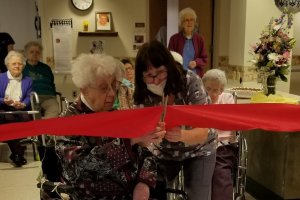
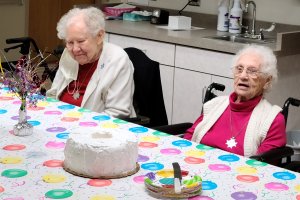
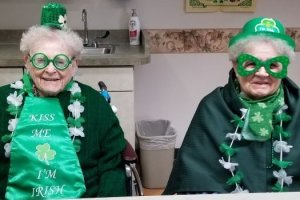
When she is ready to start her day, Franciscan Sister of Perpetual Adoration Pauline Wittry likes to indulge in an omelet, made to order just for her, with “onion, green pepper and always salsa.” She is not the only breakfast lover in her living community, as Franciscan Sister of Perpetual Adoration Cecilia Corcoran craves grapefruit and eats both halves, the segments carefully cut for her, the flesh scooped out with some assistance.
Sisters Pauline and Cecilia reside in the same living community at Villa St. Joseph, the FSPA home in La Crosse, Wisconsin. The living community they share, though, is transitioning from concepts and practices often found in many institutionalized, long-term care facilities. It’s a living community pilot in which sisters and staff — our partners in mission — are paving the way for all FSPA who’ve committed their lives to God and those in need around the world. And it’s culture reframed, relationships renewed by culture change.
FSPA’s ministry of culture change is transforming the physical environment, organizational structure and interpersonal relationships at the Villa and St. Rose Convent in La Crosse into atmospheres of true home in which sisters are directing their own lives and staff are empowered to help them do so. Action Pact, a company that provides education, training and resources to institutions for adopting such household models, is guiding FSPA and staff to provide the sisters with relationship-centered care that values their individual desires above all else.
Since 2018, as FSPA has been rigorously preparing for the merger of the Villa and St. Rose post-convent renovation in 2021, culture change has steered many, if not most, strategies and conversations. “The vision that has led the renovation is to create a home for our sisters to live in that is non-institutional, and the time had arrived to put forth the necessary efforts that would ensure once our mother house renovation was complete, it would feel like home,” says Franciscan Sister of Perpetual Adoration Eileen McKenzie.
Culture change is not a new concept that emerged from the renovation planning process; not an addition or an upgrade added to the blueprints. “There has been an element of culture change in FSPA for decades. Sisters have lived out our belief that the dignity of each person is expressed in their personal freedom to make life choices that enhance their God-given gifts, their community and the Common Good,” says Sister Eileen. “We're simply watering seeds planted long ago through those sisters and staff who have been involved in the national culture-change movement around aging.”
As part of the FSPA Villa Living Community pilot, Sister Cecilia says, “The plan is good, and our community is very invested in this experimental type of individualized care. We count as individuals.” Sister Pauline reveals that the best part of life in FSPA’s living community is that “we get excellent care. They spoil us a little bit.”
Sister Eileen makes it clear that the call to culture change is to live authentically in caring for all creation. “We cannot provide ‘CARE’ from an industrial standpoint. We don't produce ‘CARE.’ We don't buy ‘CARE.’ We can't replace one ‘CAREGIVER’ with another like they are widgets, simply getting the job done. We care when we are in respectful, dignified, loving relationships that recognize the uniqueness of the person and situation and respond accordingly. This care is the residents and our partners in mission. Ultimately, in our renovated space, we'll live out the mutual experience of care and mission together.”
Once the transformation is complete and the sisters and partners in mission from the Villa and St. Rose are thriving together in living communities under the convent’s roof, FSPA visitors will be welcomed into comfortable and inviting living communities in which sisters and staff have arranged and personalized together. A nurse who has received cross-training might be doing some light housekeeping while a group plays cards. Sister Cecilia may be enjoying a lovely grapefruit, and Sister Pauline might be relishing an omelet chock-full of onion and peppers with salsa on the side.
All sisters and our partners in mission — not just nursing and direct-care staff — have a hand in learning and implementing culture change. Exploring other person-centered living communities, hosting Action Pact training sessions, providing resources like videos and reading materials and conducting sister/staff learning circles have been ongoing since June 2019. Together, sisters and partners in mission have emerged as teams to lead the charge.
Here’s what some of our team members have to say about their culture change experience:
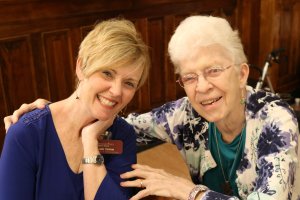
Jane with Sister Dorothy Dunbar
Jane Comeau, high involvement and Villa St. Joseph pilot team member
Leaping out of our silos has been rewarding. Not only are we creating new relationships, but we’re learning the value of shared leadership and the benefits of ensuring everyone’s voice is heard. During the process, we implemented a new set of core values that, as partners in mission working with FSPA, we aspire to. My favorite is “Discovery: we bravely cultivate a path of personal and communal growth.” We’re discovering that there is so much to unlearn as we grow.
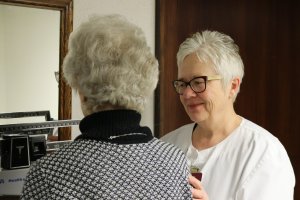
Sister Marcella Anibas with Zona
Zona Kern, merged nursing team member
Our sisters have been serving others their entire lives. As they retire, they should be empowered to exercise autonomy, build community and be meaningfully engaged in whatever ways they wish with staff who fully collaborate in the process as true partners in mission. In everything we do as individuals, in teams and as an organization, we ask, “This decision will impact the sister’s life; is she making this choice for herself?”
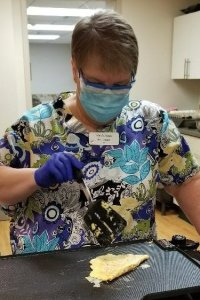
Sister Dawn
Franciscan Sister of Perpetual Adoration Dawn Kutt, merged nursing team member
Moving into relationship-centered care is a challenge, because many of our partners in mission have been in health care for years in which the focus has been task oriented and centered on routines; based on hierarchy and job description and "This is the way it has always been." The challenge is to break down these barriers and know you are entering into a relationship centered on "care" and "team," all while building a living community and closing the door on institution.
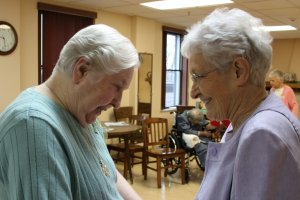
Sister Laura Schreck with Sister Marie
Franciscan Sister of Perpetual Adoration Marie Kyle, high involvement team member
The anecdotes I hear are that both sisters and staff, our partners in mission, are finding new life together. Some departments not involved with resident care have looked at their organization to see how the principles of culture change fit their departments; principles such as subsidiarity, team-building and flattening the top-down hierarchy. This is the goal for renewal of spirit within a team. This is the goal of culture change — all of us finding new life and spirit together.
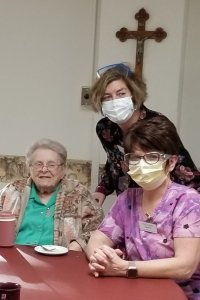
Sister Pat Sheridan and Katie Wine with Tammy
Tammy Leis, third-floor living community household coordinator
I’ve worked at the Villa since the week after I graduated from high school 38 years ago. Now, I work in unison with other partners in mission to assure quality of life, quality of care for the sisters. I love that I’m getting to know each sister on a personal level while building true, trusting relationships with each one. The team works together to complete tasks to allow for more time to engage with a sister: play a game, reminisce or do a group activity. We don’t go to work for the accomplishment of the tasks anymore. We go to work for the relationships we have grown to love.
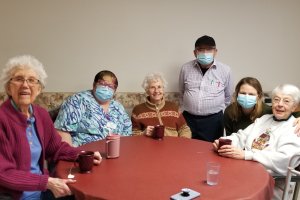
Sister Marcella Steffes, Angela, Sister Cecilia Corcoran, Michael Regules, Michelle Hundt and Sister Joan Hagemen
Angela Martin, third-floor living community homemaker
When we first learned about it I wasn't really sure what it all entailed, but the more I learned, the more interesting it seemed to get. Being here for 20 years, I wanted a change. The highlight for me is seeing and interacting with the sisters ... making something I know they will enjoy. I love seeing them more rather than being down in the kitchen all day.
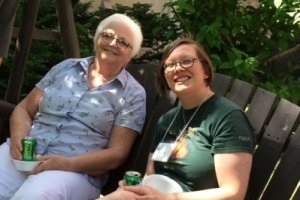
Sister Linda Mershon with Sister Julia Walsh
Franciscan Sister of Perpetual Adoration Linda Mershon, merged administration, high involvement and Villa St. Joseph pilot team member
It is complex and can be confusing. It is consistent with any kind of change in thinking; it takes a lot of energy and dedication. But we are learning, as we navigate this new path, that if we sit together, build relationships and talk about issues, the solutions rise right up out of the conversation.
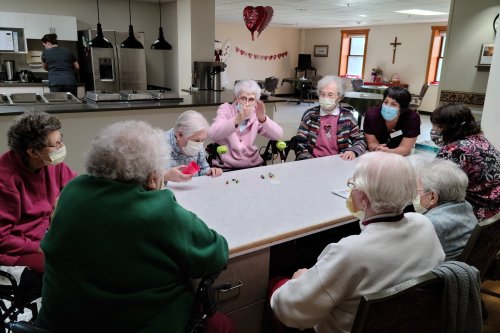
Sister Mary Ann Gaul, Sister Marian Massman, Sister Laura Schreck, Sister Margeret Schmolke, Sister Rosalia Bauer, Donna Bluske, Peggy Graef, Sister Rita Mae Bechel, Sister Marguerite Bruening
